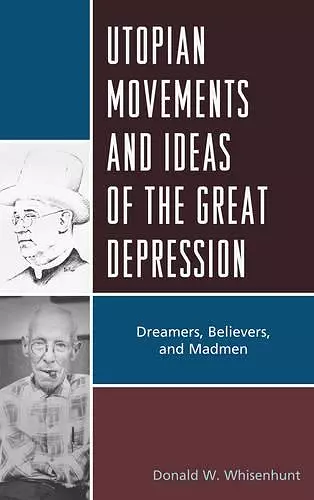Utopian Movements and Ideas of the Great Depression
Dreamers, Believers, and Madmen
Format:Paperback
Publisher:Lexington Books
Published:27th Mar '17
Currently unavailable, and unfortunately no date known when it will be back

In the 1930s, the United States was beset with an economic crisis so serious that it threatened the future of the nation. On the national level, Franklin Roosevelt initiated and developed a variety of reforms and experiments as part of the New Deal. Some Americans looking for change believed Roosevelt was going in the wrong direction, while others believed he was too timid in his reforms. Still others thought he had not broken free of the restraints placed on him by the financial interests of the country. Many Americans had their own ideas about how to address the financial crisis and took matters into their own hands. In Utopian Movements and Ideas of the Great Depression, Donald W. Whisenhunt explores several lesser-known movements for change and reform in the Great Depression Era including communal societies, proposals for reform, and analyses of several books that propose solutions to the nation's economic ills. Arguably, America has been a Utopian experiment from its beginning; the movements and ideas of the 1930s were simply the latest manifestations of that experiment. Though not well known, the people and events studied represent the thinking of some of the most articulate and driven Americans during the economic crisis. Despite their lack of obvious success, they represent an important American idea—that an average person can devise solutions to society's problems. These movements and ideas embody the American belief in progress and the power of the individual.
Here is a book that spells out—in detail—the lives, ideas, and actions of utopian thinkers, publicists, and activists in the Great Depression. . . . Each substantive chapter is heavily footnoted; the author has obviously spent many bleary-eyed hours poring over the sources that do exist for the book, and he has in some cases interviewed his subjects. There is also a helpful index. This is clearly a labor of love on Whisenhunt’s part, off and on, over several decades. . . . For those interested in the material, or in related themes, there is plenty of information, and there are extensive citations. . . . [T]he book is quite useful. * Journal of American History *
Throughout his illustrious career, Whisenhunt has had direct encounters with much of this research or these figures. It is perhaps a unique gift that he can forever document this collection of odd Utopian figures in this work. While many of them have been forgotten by history, future historians will appreciate the fact that they have been remembered, at least in Utopian Movements and Ideas of the Great Depression. * Journal of American Culture *
Well researched and documented, the six case studies [in the book] provide stand-alone insights and amusing asides into the cacophony that followed the 1929 Crash. * Nova Religio: The Journal Of Alternative And Emergent Religions *
From the iconoclastic politician Maury Maverick to the activist priest James R. Cox, [Donald W. Whisenhunt] sheds penetrating light on a procession of utopians, communal organizers, socialists, editors, and writers, a narrative gracefully written, painstakingly grounded in documentary research. . . . Each movement and individual constitutes a compelling human interest story, a tale told with compassion and empathy. Collectively, they should provoke discussion and debate among historians, students, and general readers, reminding us of the imperfect line between wisdom and folly. -- Glen Jeansonne, University of Wisconsin-Milwaukee
ISBN: 9781498557030
Dimensions: 231mm x 150mm x 15mm
Weight: 295g
200 pages